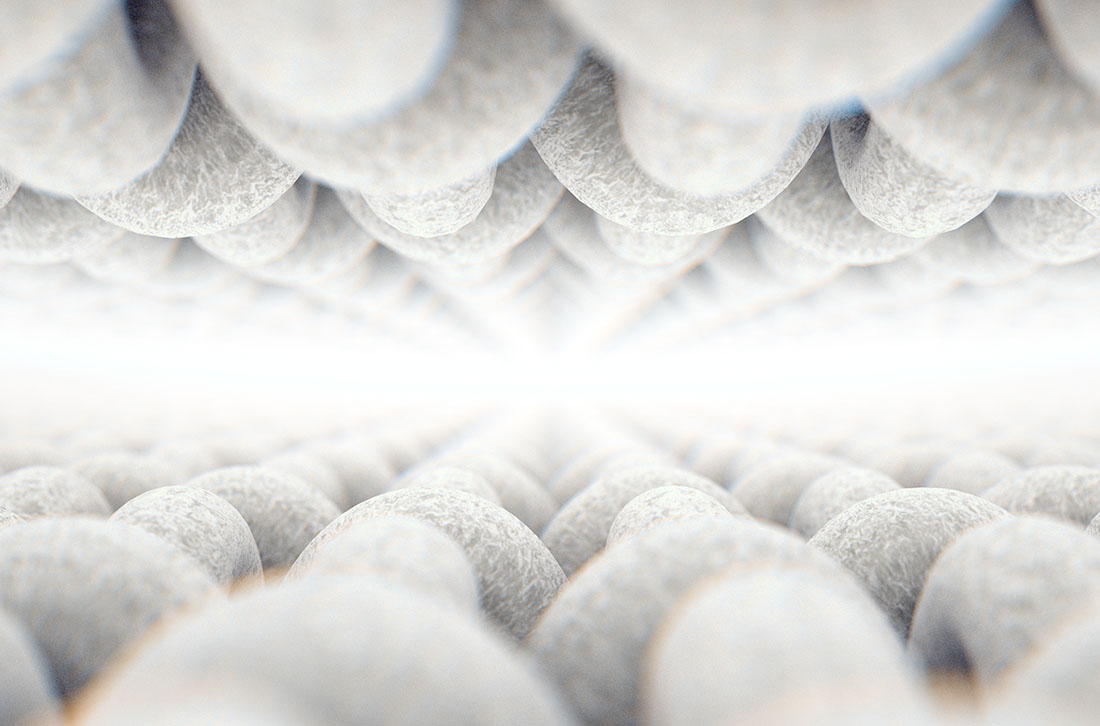In the dynamic and global textile fiber industry with its various manufacturing processes and end-uses, news and information is breaking on a daily basis. International Fiber Journal is tracking stories relevant to our industry from manmade to natural to bio-based fibers, innovations in nonwoven, woven, braided and technical textiles, technologies for additives, bonding, coatings and polymers, and applications from apparel to hygiene to transportation, and more. Here we will post news stories relevant to textile fibers and their downstream applications on an ongoing basis. Please check back for regular updates. If you have news that you feel should be added to this summary report, please email it to Matt Migliore at mmigliore@inda.media.
Most recent update: July 31, 2020
Hollingsworth & Vose Company and Midwest Textiles reach agreement to produce and distribute embroidery materials and industrial specialties
Hollingsworth and Vose Company and Midwest Textiles established a Master Distribution Agreement to support the long-term growth of Embroidery Materials and other Specialty Products. Under the agreement, H&V will supply Midwest with the leading materials in the industry, and Midwest will use their specialty converting and nationwide distribution network to reach this complex and growing market.
This broad-based Distribution Agreement follows a joint effort by the two companies earlier this year to
sell ready-to-sew face mask kits to the general public that include Midwest’s Fabric and H&V’s filtration
media. This new agreement establishes an ongoing distribution platform that could eventually support
expansion into additional products and markets.
Source: hollingsworth-vose.com and midwest-textiles.com
Italian textile machinery order intake drops 47% in second quarter
The index of orders intake for Italian textile machinery fell by 47% for the period of April-June 2020, compared to the same period in 2019. Orders fell both abroad and in Italy. There was a 44% decrease in orders on foreign markets, with domestic orders showing a 62% drop compared to the second quarter of the previous year.
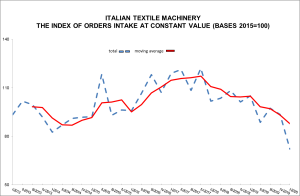
ACIMIT president Alessandro Zucchi attributed these drops to the lockdown of production units and stated that “a deep concern remains for the upcoming months.”
Source: acimit.it
AATCC program committee soliciting abstracts for 2021 AATCC International Conference
Papers are currently being solicited for subject areas listed below for the 2021 AATCC International Conference. This conference will be held April 13-15, 2021 in Charlotte, NC, USA. Interested individuals should complete the abstract submission form and provide an abstract of 125 words or less.
The program committee is soliciting abstracts for the following topics:
- Fiber, fabric and materials innovations and design
- Development in preparation, dyeing and printing coloration chemistry, application, and machinery
- LED lighting trends and color management
- E-textiles, performance fabrics and finishing innovations
- Validation for circular economy, product performance, certifications, and product claim substantiation
- Addressing challenges for environmental and social responsibility within the supply chain
- Function, design, and technology innovation to meet consumer market demands
- Addressing the digital market demands for color, hand, fit, functionality and consumer confidence
Oral and poster abstracts can be submitted to Angela Jabara.
Source: AATCC.org
Klopman chosen from 18,000 companies in Italy for ‘Industria Felix’ award
Klopman, a European company in the production of fabrics for workwear, won the third edition of the “Industria Felix” award, given for management performance and financial reliability after an analysis of 2018 financial statements. Almost 18 thousand companies from all sectors in Italy were assessed. The selection was made through a maxi investigation of the economic and financial quarterly Industria Felix, in collaboration with Cerved, the largest Italian rating agency.
Klopman was announced as the winner by a scientific committee made up of high-profile economists, entrepreneurs and managers from various organizations and companies that sponsor Industria Felix. The committee used an objective financial algorithm as an evaluation criterion. This was then compared to the Cerved Group Score, the indicator of financial reliability of Italian companies developed by the most important rating agency in Italy and the fifth largest in Europe, which specializes in evaluating companies’ economic and financial performances.
Source: klopman.com
FET-100 Series hits $20 million in sales
Since its launch in 2015, Fibre Extrusion Technology Ltd of Leeds, UK has taken 50 orders for the FET-100 Series, with a value of more than $20 million. The FET-100 Series is a pilot and laboratory scale melt spinning system that can be specified to be multi-functional, allowing for easy and fast conversion between material formats. It configures to all combinations of multifilament, monofilament and melt spinning of nonwoven structures, as required.
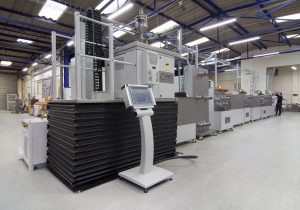
The FET-100 is suited for the biomedical and composite sectors since its upgrade to meet field requirements. It can be used in the development of biomedical materials, including the engineering polymers such as PPSU, PEI, PEEK and PC. FET systems are also suitable for processing sustainable polymer types (S-Polyamides, PLA, PHA, S-PET etc.). For composite applications, this equipment facilitates the development and small volume production of pre-cursor synthetic textile materials used in the manufacture of high performance composites. These include “engineering polymers” such as PPSU, PEI, PEEK and PC Polycarbonates. FET systems are also suitable for processing sustainable polymer types (S-Polyamides, PLA, PHA, S-Pet, etc.), ideal for the production of bio-degradable composite materials.
Source: fetuk.com
Purdue-affiliated Poly Group partners with Royer Corp. to develop new antimicrobial material options
Royer Corp. and Poly Group LLC finalized an exclusive partnership in late June that results in the manufacture of antimicrobial custom plastic injection molded parts in Madison, Indiana. Royer will infuse Nouvex material in a variety of custom injection-molded applications, such as airline and mass transit interior parts, food service and hospitality components/disposables, cosmetic applicators, housewares and commercial product pieces.
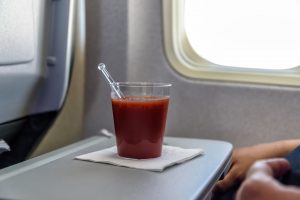
Nouvex antimicrobial technology was discovered at Purdue University by a group led by Jeffrey Youngblood, a professor in Purdue’s School of Materials Engineering. Poly Group LLC holds an exclusive, worldwide license to the IP covering Nouvex, which includes a U.S. patent.
Source: royercorp.com and purdue.edu
Consortium develops first textile palm fibers and reinforcements
A consortium of five Egyptian researchers have developed the world’s first high-performance fibers and reinforcements extracted from the byproducts of pruning of date palms, such as frond and fruit stalks, also known as PalmFil. The fiber is not only sustainable, but also economical in manufacturing, compatible with textile and composite processing and offers the properties needed for lightweight cars of the future, according to the consortium.
“In the 1980’s the shift from natural fibers to manmade fibers was mainly to bridge the gap between the increasing demand for textile fibers and the limited supply of natural fibers,” said Mohamad Midani, Ph.D., a partner in the PalmFil Consortium. “In order to reverse this shift, there is a need to explore more sources of natural fibers and increase the biodiversity of fiber crops. This is actually what we did, there are more than 140 million date palms mostly concentrated in the Middle East and North Africa, generating yearly more than 4.8 million tons (dry wt.) byproducts of pruning regarded as agriculture waste. This represented a burden on palm growers, and was the main cause of fire accidents and infestation by dangerous insects. Those byproducts could otherwise be transformed into 1.3 million tons/year natural textile fibers, ranking third after cotton and jute.”
The new fiber represents a sustainable material base for a wide spectrum of industries. Ranging from natural reinforcements for composites in automotive and sporting goods, plaster reinforcements in construction, burlap sacks for packaging, ropes, and twines, non-wood papers, and other consumer products. The fiber is 100% biodegradable and compostable and has specific tensile strength 5 times higher than structural steel, and equal to those of flax, hemp and sisal. Its vibration damping and acoustical insulation is higher than those of glass and carbon and with thermal insulation higher than carbon. Moreover, it can be easily blended with other long fibers, such as flax, sisal, and abaca, or it could be chopped and blended with hemp, kenaf, and jute.
The PalmFil consortium has more than 50 years of combined experience in fiber science, textile technology and composite engineering. The consortium is currently seeking partnership to further develop, scale-up, and commercialize PalmFil technology.
Source: palmfil.com
AATCC offers blotting paper for use with PPE testing
With the rise in production and testing of medical personal protective equipment (PPE), access to correct testing apparatus and materials is critical. AATCC now offers a one-stop shop for impact penetration testing needs, including Blotting paper suitable for AAMI PB70 classification testing. AAMI PB70 Level 1-3 certification and testing requires using AATCC TM42, Test Method for Water Resistance: Impact Penetration along with a Blotting Paper that matches the paper specifications included in the AAMI PB70 standard.
AATCC offers a recorded webinar on Impact Penetration Testing for Textiles.
For more information about the test method and selecting the correct Blotting Paper, visit aatcc.org/impact-
Source: aatcc.org
Messe Frankfurt celebrates 780th anniversary
“Trade fairs have driven our city’s development. Nowhere else are trade fairs such an integral part of a city’s history as they are in Frankfurt. Emperor Frederick II’s official grant of trade fair rights marks the historical origin of a success story that started around Frankfurt’s City Hall (Römer) 780 years ago and continues to this day. From these beginnings, Messe Frankfurt evolved over the centuries into the world’s largest operating trade fair company. Yet even after 780 successful years, it remains true to the tradition of trade and internationality that is firmly rooted in its home city of Frankfurt.”
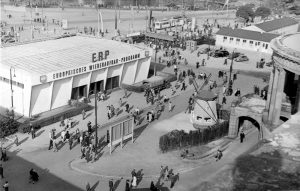
Following a global lockdown lasting multiple months due to the COVID-19 pandemic, Messe Frankfurt is once again holding trade fairs. It all kicks off with Intertextile Shenzhen Apparel Fabrics on 15 July 2020 in China. The trade fair is part of a network of some 50 international textile events in Messe Frankfurt’s portfolio, which has included Frankfurt Fashion Week since June. Trade fairs are also resuming business in Germany – in strict compliance with an extensive protection and hygiene concept. Smaller events are already underway on the Frankfurt exhibition grounds, and trade fairs will be joining them soon: Nordstil will be leading the way in Hamburg in September, followed by the Frankfurt Book Fair in October. Replacement dates have also been planned in 2020 for many of the Group’s postponed events worldwide.
Wolfgang Marzin, President and Chief Executive Officer of Messe Frankfurt: “We are delighted that our events will once again be serving as platforms for personal interaction. Our resumption of event operations worldwide demonstrates Messe Frankfurt’s flexibility in responding to challenges. We are able to offer our customers around the world the platforms they need – regionally, nationally, at a European level and globally – while satisfying today’s new local regulations and requirements. The past 780 years have demonstrated time and again just how important trade fairs are for promoting economic recovery in times of crisis, and our customers have been making it clear to us that face-to-face encounters and dialogue are irreplaceable.”
Source: messefrankfurt.com
PFNonwovens names new CEO
PFNonwovens Holding s.r.o. (“PFN”), the holding company of the global hygiene nonwovens textile producer, said it has appointed Mr. Cedric Ballay as the PFN Group’s new Chief Executive Officer. The appointment is the result of a long-planned succession process at the helm of the Prague-headquartered group.
Mr. Ballay joins PFN from Berry Global Group, Inc. where he served as Executive Vice President and General Manager for the Health, Hygiene & Specialties Division in Europe, the Middle East, Africa and India (EMEIA). He joined Avintiv, a Berry Global acquisition, in July 2013 as their Vice President for Sales and Product Development EMEIA after spending 16 years with General Electric, progressing through leadership roles in Information Technologies, Lean 6 Sigma, Commercial and General Management. Mr. Ballay is a board member of the European Disposables and Nonwovens Association (EDANA) and holds a Master’s degree in Business Administration from ESADE (Escola Superior d’Administració i Direcció d’Empreses) in Barcelona, Spain, and a Master’s degree in Electronics and Telecommunications from the Grenoble Institute of Technology in Grenoble, France.
”I am excited to be joining PFN, a recognized leader in the space of nonwovens. I believe the company has a great business model, strong partners, and a talented management team which uniquely positions PFN for growth. The team and I look forward to leading it into its next chapter!“ said Mr. Ballay.
Source: pfnonwovens.cz
ANDRITZ receives order from Eruslu Nonwoven for spunlace line in Turkey
ANDRITZ has received an order from Eruslu Nonwoven Group to supply a complete neXline spunlace line for its plant located in Gaziantep, Turkey.
The line has a production capacity of 18,000 t/a and is scheduled for installation and start-up at the beginning of 2021.
The line will be able to process a wide range of fibers, like polyester, viscose, lyocell, and bleached cotton, with grammages from 30 up to 75 gsm. It will produce high-quality wet wipes for cosmetics applications, fem care and baby diapers, dust wipes, hair dressing towels, medical bandages and gauzes, and many other products. The new line will enable Eruslu to diversify its product portfolio into new technical applications.
ANDRITZ will deliver a complete line, from web forming to drying.
The scope of supply includes:
- one complete set of Laroche opening and blending machinery,
- two inline high-speed TT cards,
- one JetlaceEssentiel unit, which is the benchmark for hydroentanglement processes, including an ANDRITZ full filtration unit,
- one neXdry double drum through-air dryer,
- one neXecodry S1 system for energy saving
ANDRITZ and Eruslu have a long-term and successful collaboration that began in 2009. This is the fourth spunlace line to be provided by ANDRITZ, and it confirms the strong partnership between the two companies.
Source: andritz.com
ECOTEK 360 partners with Fiber Conversion to commercialize recycled fabric technology
ECOTEK 360, a wholly owned subsidiary of Global Fiber Technologies, has signed a collaboration agreement with Fiber Conversion Inc., of Broadalbin, NY., to further the commercial viability of ECOTEK 360’s “rejuvenation technology.”
Chris Giordano, Global Fiber Technologies’ chairman and president stated, “We are now at the point where we feel confident that we can start making commercial grade re-purposed products from what are known as “end of life fabrics” that are headed for a landfill or incinerator. Paul Serbiak our CEO has brought ECOTEK360 to the point where we are getting solid results from the R & D tests that we have run in with our patent pending process.
“The collaboration with Fiber Conversion is particularly important because it allows us to see how our process for rejuvenating textile fibers works on a large commercial grade machine in comparison to our pilot line at the facility in Somerset NJ. Fiber Conversion has a large facility inclusive of two commercial grade recycling lines and a full machine shop which will allow us to start testing our commercial viability immediately.”
Source: globalfibertechnologies.com
Schleswig-Holstein’s Minister President visits Oerlikon Nonwoven Neumünster manufacturing facility
Since the outbreak of the coronavirus pandemic, the worldwide demand for protective masks and apparel has resulted in a record number of new orders in the high double-digit millions of euros at the Oerlikon Nonwoven business unit of the Swiss Oerlikon Group, according to the company. To recognize Oerlikon Nonwoven’s achievements in this regard, Schleswig-Holstein’s Minister President Daniel Günther visited the company’s production facility. Rainer Straub, Head of Oerlikon Nonwoven, was thrilled, stating: “The machines and systems for manufacturing manmade fiber and nonwovens solutions from Neumünster enjoy an outstanding reputation throughout the world. It is especially in this crisis that the technology from Schleswig-Holstein has proven itself to be absolutely world-class.”
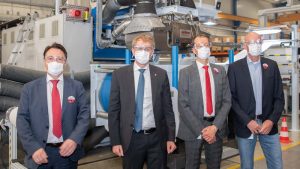
In addition to a tour of the meltblown system and its assembly and production facilities, the visit by Minister President Daniel Günther highlighted the region’s five-million-euro digitalization program. Minister President Günther, said “The State Government is supporting higher education institutions and students in the present coronavirus crisis. With a five-million-euro digitalization program, we are investing on the long-term digitalization of our higher education institutions. With this, we are overall creating a future for young people, particularly also for those who could very well go on to invent the next generation of manmade fiber systems.”
The Oerlikon Nonwoven meltblown technology – with which nonwovens for protective masks can also be manufactured, among other things – is capable of high-efficiency production of filter media made from plastic fibers. “Ever more manufacturers in the most diverse countries are hoping to become independent of imports. Therefore, what we are experiencing in Germany is also happening in both industrialized and emerging countries throughout the world,” said Straub. In addition to China, Turkey, the United Kingdom, South Korea, Austria and numerous countries in both North and South America, Australia and Germany are among the countries to which Oerlikon Nonwoven will be delivering machines and equipment before the end of 2021.
Source: https://www.oerlikon.com/manmade-fibers
Södra earns Recycled Claim Standard certification for OnceMore pulp
Södra received certification to the Recycled Claim Standard (RCS). “This certification enables Södra to produce and sell RCS-certified OnceMore pulp. It means that customers receive a promise that recycled cotton has been added to the mixture and that the cotton is derived from collected textiles that would otherwise have been treated as waste,” said Eva Gustafsson, Sustainability Coordinator at Södra.
The Recycled Claim Standard is an international, voluntary standard that sets requirements for third-party certification of products containing recycled material. The certification is administered by Textile Exchange, an organisation focused on increasing sustainability in the textile industry and the textile supply chain.
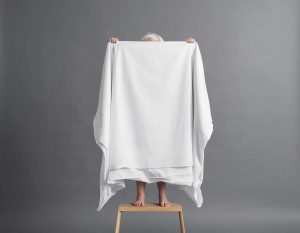
“The Recycled Claim Standard is intended to show that you are processing and selling products that contain at least 5 percent recycled material. For Södra, this means that we can sell our OnceMore pulp with an admixture of recycled cotton as RCS-certified. RCS certification of products sold to end-consumers requires certification and traceability throughout the supply chain. The certification shows that our OnceMore pulp contains cotton that really is recycled and derived from collected textiles that would otherwise have been treated as waste,” said Eva Gustafsson.
With OnceMoreᵀᴹ, Södra has created a globally unique solution where large volumes of used cotton and blended fabrics can be re-used to make new clothing and textiles. Only a negligible proportion of all textiles are re-used today. Nearly everything is sent to landfill or incineration. That will change now that Södra can accept large amounts of textiles for recycling. The long-term target is to use 25,000 tonnes/year of textiles that would otherwise be treated as waste.
Source: sodra.com
HeiQ Viroblock NPJ03 antiviral textile treatment certified as safe and sustainable
HeiQ’s antiviral textile technology, HeiQ Viroblock NPJ03, which leverages a formulation that contains a minute amount of recycled silver active ingredient and fatty liposome vesicle components, has been certified as safe and sustainable as all its ingredients are cosmetic grade, bio-based and recycled.
HeiQ recently launched HeiQ Viroblock NPJ03, an antiviral and antibacterial textile treatment, which has shown to reduce 99.99% of human coronavirus SARS-CoV-2, the virus that causes COVID-19, along with other enveloped viruses and bacteria.
Some research[1] has shown human coronavirus SARS-CoV can persist for up to two days on surgical gowns at room temperature. While the global textile industry is rapidly adopting antiviral textile treatments to bring antiviral masks, clothes and home fabrics to the market, HeiQ believes it is important to consider the profile of different technologies including questions of toxicity, safety, antimicrobial resistance, and wastewater treatment.
The HeiQ Viroblock NPJ03 formulation is EU REACH and US FIFRA compliant, OEKOTEX certified, ZDHC and bluesign homologized. Viroblock NPJ03-treated textile articles are compliant with EU BPR and US EPA. HeiQ Viroblock respirator masks with antibacterial and antiviral surface have been registered as medical device by Swissmedic and approved by US FDA.
Beta Analytics Testing Laboratory has certified that HeiQ Viroblock NPJ03 contains 72% bio-based carbon. Test results are accredited to ISO/IEC 17025:2005 Testing Accreditation PJLA #59423 standards. HeiQ Viroblock NPJO3 is currently undergoing homologation for the USDA bio-preferred certification. Specialities S.R.L (Italy), a surface chemistry research and development company, has also confirmed that all ingredients of HeiQ Viroblock NPJ03 are selected from the International Nomenclature of Cosmetic Ingredients (INCI).
[1] Kampf G, Todt D, Pfaender S, Steinmann E. Persistence of coronaviruses on inanimate surfaces and its inactivation with biocidal agents. Journal of Hospital Infection. 2020 Feb 6.
Source: heiq.com
INDA announces WOW and RISE conferences will be all-virtual in 2020
INDA, Association of the Nonwoven Fabrics Industry, announced its World of Wipes and RISE (Research, Innovation & Science for Engineered Fabrics) will be presented in an all-virtual format for 2020 in deference to corporate travel policies and individual concerns about travel.
Registration is open for the virtual World of Wipes International Conference, aligned with the WIPES Academy training course, and the RISE® (Research, Innovation & Science for Engineered Fabrics) Conference.
Virtual WOW offers 30 speaker presentations focused on breakthrough wipe technologies, buyer demographics, sustainability, industrial and flushable wipes, substrates, preservatives, single use plastics, and strategy-setting market intelligence. Presentations will also address industry changes prompted by COVID-19. All speaker presentations will be recorded and available near real-time and on-demand for 12 months.
Participants will connect with senior-level wipes professionals through audio and visual presentations on relevant technical and educational content with business engagement opportunities through virtual tabletop displays, web pages, video, live chat, and calendar appointments.
Virtual WOW Event Schedule:
- Virtual WIPES Academy – August 25-26
- Virtual WOW™ Conference Presentations – August 25-27
- 2020 World of Wipes Innovation Award® Presentations – August 26
- Virtual WOW™ Tabletop Displays – August 26-27
- 2020 World of Wipes Innovation Award® Announcement – August 27
- For Virtual WOW™ conference information visit: https://www.worldofwipes.org/conference.php
Virtual RISE™ offers 23 speaker presentations focused on new developments in polymers, fibers, additives, and fabrics, from sourcing and disposal to reuse amid the trends that are driving nonwoven advances.
Virtual RISE Event Schedule:
- Virtual RISE Conference Presentations – Sept. 29-30
- RISE 2020 Innovation Award Presentations – Sept. 29
- RISE 2020 Innovation Award Announcement – Sept. 30
- For Virtual RISE conference information visit: https://www.riseconf.net/conference.php
Source: inda.org
* International Fiber Journal is owned by INDA, Association of the Nonwoven Fabrics Industry (inda.org).
Sateri joins Fashion Industry Charter for Climate Action, pledges ambitious climate change goals
Sateri has signed the Fashion Industry Charter for Climate Action, becoming the first viscose producer in China to support this global fashion agenda. An initiative convened by the United Nations Framework Convention on Climate Change (UNFCCC), this charter calls on the fashion industry to support the goals of the Paris Agreement in limiting global temperature rise to well below two degrees Celsius above pre-industrial levels, by achieving 30 per cent aggregate reduction in greenhouse gas (GHG) emissions by 2030, including the supply chain.
Niclas Svenningsen, Manager of Global Climate Action, UNFCCC, said, “UNFCCC is excited to have Sateri joining the Fashion Industry Charter on Climate Action and committing towards global climate action as the first Chinese viscose producer to do so. We hope that it will inspire more textile companies from China to join and take action.”
As a signatory of the Charter, Sateri will participate in Working Groups, which bring together stakeholders and experts in the fashion and textile sectors. In recent months, Sateri has joined several other leading industry multi-stakeholder associations. These include the Sustainable Apparel Coalition (SAC), China Association of Circular Economy (CACE), and the European Disposables and Nonwovens Association (EDANA).
Allen Zhang, President of Sateri, said, “Sateri is committed to growing our business as sustainably as we can. Our adoption of the Fashion Charter goals is a bold leap but we believe that pushing the boundaries is necessary. We are also stepping up on our engagement with industry partners to be part of the collective action to accelerate efforts against climate change. As we formulate Sateri Vision 2030 for a sustainable business, carbon reduction will be one of our key focus areas”.
In addition to stepping up greenhouse gas emission reductions in its own operations, the company will continue to support decarbonization efforts of the downstream textile value chain. Late last year, in collaboration with the China National Textile and Apparel Council (CNTAC), a Climate Leadership Whitepaper was published. The paper analysed how innovation in Sateri’s EcoCosy fiber products help reduce carbon emission during yarn and fabric manufacturing stages, and also proposed next steps in achieving industry-wide emission reduction goals.
Source: sateri.com
Clinical trial shows natural and purified cotton fibers safe for all skin types
A clinical trial commissioned by Cotton Incorporated has concluded that cotton is safe for use on sensitive skin. The trial, conducted between October and December of 2019, found that neither mechanically cleaned nor purified cotton fibers produce any irritation response on any type of skin.
“Today, consumers, retailers, manufacturers and governments are concerned about product safety. Cotton has always been understood to be safe but Cotton Incorporated has gone a step further to provide proof. This research clinically proves that cotton is safe for use against even the most sensitive skin,” says Janet O’Regan, director of nonwovens marketing at Cotton Incorporated.
The clinical trial was conducted by Product Investigations Inc., an independent lab specializing in testing using the Human Repeat Insult Patch Test (HRIPT). Approximately half of the 200 participants had self-reported sensitive skin, and all participants were tested with both natural cotton and purified cotton fibers over a 7-week period. Through the trial, both forms of cotton produced zero irritation response on any of the participants.
Cotton fiber is often used in medical, cosmetic and personal care products where it comes into contact with skin. “From these clinical findings, individuals with or without sensitive skin can be assured knowing cotton will not cause any irritation,” according to Joseph B. Shelanski, CEO and director of biophysical research at Product Investigations Inc.
Info sheet detailing results of this study: https://www.cottonworks.com/wp-content/uploads/2020/05/Cotton-Hypoallergenic-Brochure.pdf
Source: cottonworks.com
How to overcome your splicing challenges and achieve peak production efficiency
For nonwoven fabric producers and/or those who use nonwovens during production, splice tapes are commonly employed as part of the process. Splice tape ensures a continuous workflow by combining multiple rolls of fabric in a production environment. However, there are multiple challenges that come along with the splicing process. For example:
- How can you ensure that any part of the splice area does not end up in your final product?
- Can the tape bond endure pressures applied from the machines in your production line?
- Is the tape flexible enough to not cause damage?
Davik has developed an article that discusses the qualities and benefits of splice tapes and how they can be used to significantly improve the splicing process and thereby optimize production.
Read the article: https://www.daviktapes.com/splice-tape/
Source: daviktapes.com
KARL MAYER, STOLL finalize merger
KARL MAYER and STOLL officially completed their merger July 1, 2020, after agreeing in principle in late February.
The merger means KARL MAYER is now the leading provider of solutions for the two most important stitch-forming processes, flat knitting and warp knitting. The company’s entire expertise in the fields of warp knitting, flat knitting as well as technical textiles, warp preparation for weaving and digital solutions is now housed within the company.
When it comes to the manufacture of products for warp knitting, warp preparation for weaving and the areas of technical textiles, KARL MAYER employs more than 2,300 employees worldwide. STOLL, with roughly 1,000 employees, stands for progressive tools and services for the knitting systems of the future.
STOLL will continue its activities within the KARL MAYER Group as an autonomous business unit. The brand will be carried on independently, and represents KARL MAYER‘s expertise in the field of flat knitting technology. STOLL’s previous CEO, Andreas Schellhammer, will serve as president of the STOLL business unit within the KARL MAYER Group.
Source: karlmayer.com


